|
|
|
Sort Order |
|
|
|
Items / Page
|
|
|
|
|
|
|
| Srl | Item |
| 1 |
ID:
138913


|
|
|
|
|
| Summary/Abstract |
The Lee Myung-bak government’s response to the sinking of the South Korean warship Cheonan in March 2010 was a hard-line policy that met with widespread public doubt and criticism. His conservative government reacted to critics with suppression of free speech and use of state power to control the media. As a result, international ratings of press freedom and Internet freedom for South Korea were downgraded. The government relied on national security rhetoric; however, its primary legal tools were not the National Security Law but rather criminal defamation and broadcasting and Internet regulations. I discuss some factors that make South Korean democracy vulnerable to erosion of press freedom, including the enduring influence of the Cold War, fragility of liberalism, and the lack of executive constraints.
|
|
|
|
|
|
|
|
|
|
|
|
|
|
|
|
| 2 |
ID:
099944


|
|
|
|
|
| Publication |
New Delhi, Penguin Books, 2003.
|
| Description |
286p.
|
| Standard Number |
9780143063728
|
|
|
|
|
|
|
|
|
|
|
|
Copies: C:1/I:0,R:0,Q:0
Circulation
| Accession# | Call# | Current Location | Status | Policy | Location |
| 055439 | 321.8/ZAK 055439 | Main | On Shelf | General | |
|
|
|
|
| 3 |
ID:
138181


|
|
|
|
|
| Summary/Abstract |
The greater the power, the more dangerous the abuse,” as Edmund Burke warned us, and sure enough the recentralization of political and economic power in Hungary under the post-2010 governments of Prime Minister Viktor Orbán has reversed many of the gains of the 1989 revolution. The Polish anticommunist dissident Adam Michnik, a great hero to the younger, more liberal Orbán, once argued that nationalism was the last stage of communism: Both could deploy demagogic language denouncing “the enemies of the people,” but the prioritization of national pride was a far more malleable proposition than the achievement of communism. What needs to be explained, therefore, is how, over 20 years after becoming the first country to cut a hole in the Iron Curtain (by allowing East Germans to cross the border into Austria), Hungary has been returned to authoritarianism.
|
|
|
|
|
|
|
|
|
|
|
|
|
|
|
|
| 4 |
ID:
167465
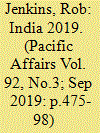

|
|
|
|
|
| Summary/Abstract |
India’s 2019 general election returned Prime Minister Narendra Modi, leader of the Hindu nationalist Bharatiya Janata Party (BJP), to a second term in office. The BJP increased its parliamentary majority and expanded beyond its core regions. Its victory was all the more impressive given the economy’s mediocre performance during Modi’s first five years in office and serious signs of political disaffection, including BJP losses in important state-level elections, just months before the national campaign commenced. Modi’s ability to turn things around is a testament to his personal popularity as well as the BJP’s well-funded and organized political machine. But it also reflects the party’s willingness to stoke nationalist passions, target minority groups, harass civil society, politicize national security, and undermine institutions of accountability. Despite the BJP’s impressive showing, and some of the methods by which it was achieved, claims that the 2019 election represents a transformation in the nature of Indian politics should be treated with caution.
|
|
|
|
|
|
|
|
|
|
|
|
|
|
|
|
| 5 |
ID:
139613
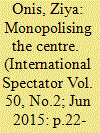

|
|
|
|
|
| Summary/Abstract |
The loss of reform momentum and rising authoritarianism during the most recent phase of AKP government indicate that Turkish democracy is in crisis. Although the Gezi protests emerged as a movement from below reacting to the rising authoritarianism of the AKP government, it did not turn into an organised and sustainable movement. Similarly, external anchors or reputational effects are failing to reverse the backsliding of Turkish democracy. The notion of ‘bounded communities’ is a key concept in accounting for the continued dominance of Erdoğan and the AKP in the face of significant pressure for change. Erdoğan’s victory in the August 2014 presidential elections generates both benign and pessimistic scenarios for the future of Turkish democracy.
|
|
|
|
|
|
|
|
|
|
|
|
|
|
|
|
| 6 |
ID:
179208
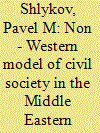

|
|
|
|
|
| Summary/Abstract |
The article analyzes the specific experience of civil society development in the Middle East, which remarkably exposes the dilemma underlying the civil society concept as a matrix of working democracy. This concept limits the understanding of the very phenomenon of civil society and peculiarities of its functioning in the region. An analysis of the Middle Eastern specifics requires a functional approach and a hybrid definition of civil society. This approach has a number of heuristic advantages over both liberal and critical theories. The article outlines the Middle Eastern model of civil society and postulates the key characteristic of illiberal civil society—it becomes conducive to the reproduction of authoritarian regimes even despite its institutional diversity. The analysis shows the ambivalence of civil society in the Middle East as a space of limited freedom of political/non-political activity and as a testing ground for the development of various tools designed to curb civic initiative. The liberal model of civil society, directly incorporated in state-building, is turned upside down in the Middle East. Civil society organizations in this region are hardly functional as an outpost for promoting liberal democratic values because they prove to serve the interests of the elite or alternative political forces much more than the interests of ordinary citizens.
|
|
|
|
|
|
|
|
|
|
|
|
|
|
|
|
| 7 |
ID:
172480
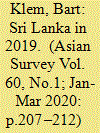

|
|
|
|
|
| Summary/Abstract |
Sri Lanka was confronted with three interrelated crises in 2019: the unresolved gridlock of last year’s constitutional crisis; the Easter bombings and their turbulent aftermath; and the coming to a head of fiscal shortfalls and debt burdens. Growth is stalling, living costs are rising, deficits are widening, and the price of Sri Lanka’s debt is weighing heavily on the government budget. In the presidential elections, Gotabaya Rajapaksa, heir of the Rajapaksa dynasty, prevailed with a landslide.
|
|
|
|
|
|
|
|
|
|
|
|
|
|
|
|
| 8 |
ID:
185215
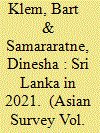

|
|
|
|
|
| Summary/Abstract |
The Rajapaksa government consolidated its position with new laws, special task forces, and public-sector appointments. With the opposition wiped out, Sri Lanka now has a unipolar political landscape. Two successive waves of COVID-19 infections caused a rising death toll and necessitated severe lockdowns. The resulting economic problems exposed structural weaknesses in Sri Lanka’s macroeconomic constellation, with depleting foreign exchange and an acute debt burden. These interlocking crises triggered new forms of protest and a new convergence of previously disparate societal opposition.
|
|
|
|
|
|
|
|
|
|
|
|
|
|
|
|
|
|
|
|
|